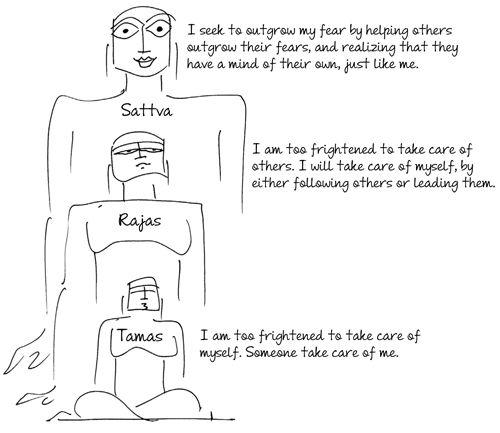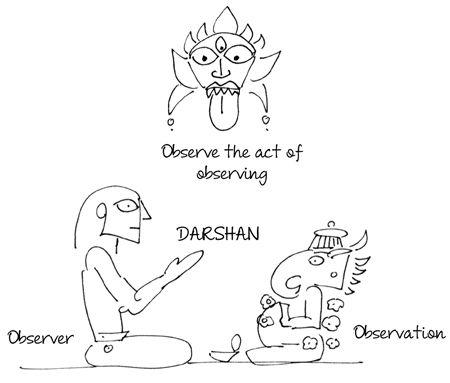Read Business Sutra: A Very Indian Approach to Management Online
Authors: Devdutt Pattanaik
Business Sutra: A Very Indian Approach to Management (12 page)

Svaha is what the yajaman invests: goods, services and ideas. Tathastu is the return on investment: revenue in the marketplace or salary paid by the employer, or even the services offered by the employee. It all depends on who plays the role of the yajaman, who initiates the yagna. The yagna can operate both downstream, as well as upstream, so the devata can either be the buyer or the seller, the investor or the entrepreneur, the employer or employee, director or doorman.
Paresh believes that because he pays a good salary, his cook prepares his meals just the way he likes them. He is the yajaman and the cook is the devata. The cook, however, believe that it is his skill at preparing good meals which gets him a good salary from Paresh. In the cook's imagination, he is the yajaman and Paresh the devata. Both do svaha, which gives them a satisfactory tathastu.
A yagna is declared a success only if it ushers in wealth and prosperity. Everyone agrees then that Lakshmi has arrived. Lakshmi is the goddess of wealth. She is also goddess of auspiciousness; her image adorns not only Hindu homes but also Jain temples and Buddhist stupas, indicating her popularity even amongst those who shunned ritual.
Her name has two roots: laksh, meaning target and lakshan, meaning indicator. Was the purpose of a yagna the generation of wealth? Or was wealth generation simply an indicator of some other goal? The answer to this question is the typically Indian, "Depends!"
- He of tamas-guna will agree with what the majority says.
- He of rajas-guna will see Lakshmi as the target.
- He of sattva-guna will see Lakshmi as an indicator of personal growth.
In most societies, he of tamas-guna makes up the majority while he of sattva-guna makes up the minority. A successful society is one that is directed by this minority.

Guna means personality. It indicates how we think and feel. It depends on how we imagine the world and ourselves in it. It is an outcome of fear.
- He of tamas-guna is too frightened to have an opinion of his own; he is dependent on the opinions of others.
- He of rajas-guna, is too frightened to trust the opinions of others; so he clings to only his opinion and those of others that favours him..
- He of sattva-guna, trusts other people's opinions as well as his own and wonders why different people have different opinions of the same thing. Sensitivity, introspection and analysis help him discover and outgrow his fears.
In management science, business is about generating Lakshmi, ethically and efficiently. Behavioural science, which informs human resource practice, states that personality cannot change; it is hardcoded in the brain before puberty; only behaviour can be modified and habits changed, made more efficient and ethical. This is why business growth is seen as economic growth, regardless of people growth. Business starts by articulating the tathastu first (target), then the plan and resources for executing the svaha (tasks). Skills come later. What matters are the offering, the gestures and the exclamations; in other words, the process. The personality of the yajaman does not matter. His fears do not matter. His feelings do not matter. In fact, he is expected to be a professional, act without emotion. Besides, he is always replaceable, making the yagna more important than the yajaman.
Suhasini serves fast food at an international fast food centre. She is expected to speak in English and is trained on how to greet the guests. She knows that the customer can speak Marathi or Hindi, both languages that she is fluent in but her supervisor is watching her, as is the CCTV, and she can lose points for not following the rules. Rules have ensured the chain is highly efficient and profitable. So she puts on her artificial smile, continues to speak in English and does nothing to comfort the customer, even though she feels miserable about the whole situation. Neither her views nor the annoyance of a single customer really matter.
But according to Vedic scriptures the yagna had no independent existence outside the yajaman. Business is always about people: of people, by people, for people. Everything hinges on the bhaav of the yajaman towards the devata, the feeling with which he offers the svaha and receives the tathastu. Bhaav also means value. The feeling of the yajaman determines the value he grants to the devata.
- He of tamas-guna, will look upon the devata with the bhaav of an unconditional follower (shudra-varna), who is totally dependent on the devata.
- He of rajas-guna, will look upon the devata with the bhaav of a conditional follower (vaishya-varna) or a conditional leader (kshatriyavarna). He will always value the devata for his possessions and not for who he is. He will blame the devata for all his problems and resent his own dependence on the devata.
- He of sattva-guna, will look upon the devata with the bhaav of a dependable, independent, unconditional leader (brahmana-varna). He values the devata, includes the devata, protects and provides for him, provokes him to grow, knowing that the devata may be too frightened to reciprocate.

Feelings change when mindset changes; the mindset changes when fear is outgrown. For that we have to pay attention to fear and what it does to us. Every human being may have different physical and mental capabilities and capacities, different fortunes and social stations, but everyone has the same ability to gaze upon fear.
Gaze is under voluntary control; it is not something we inherit. Gaze can be long-term or short-term. Gaze can be narrow or wide. Gaze can be superficial or deep. But everyone can gaze. Gaze allows us to expand or control our mind by being mindful of fear—our fear and the fears of others, how it shapes our mind, hence our feelings, which impacts how we engage with the world and what kind of relationships we end up having. Meditation, contemplation and introspection are all about becoming more aware of our gaze.
- Everyone sees objective reality, all that is tangible and measurable, or saguna. This is drishti, or sight.
- Everyone can 'see' subjective reality, thoughts and feelings, the fears underlying actions that are neither tangible nor measurable, or nirguna. This is divya-drishti, or insight.
- Everyone can also let the subjective truth reveal the subject: the varna of the one who is observed as well as the varna of one who is observing. This is darshan.
Those who did darshan first were known as the rishis, or the sages of India, often identified as 'seers', those who saw what others would not see.


Darshan is also a Sanskrit word which means philosophy or worldview. It is also a common religious practice among Hindus: devotees are encouraged to look at the image of the deity, which looks back at the devotee with large, unblinking eyes. Placed atop the temple doorway is a head with protruding eyes watching the act of observation.

The rishis realized that humans are not only capable of seeing varna, but can also rise up the varna ladder by outgrowing fear. However, this can only happen when we help others outgrow their fear. That is why they designed the yagna, as a tool that compels us to pay attention to others.
Using the yagna, the yajaman can become less dependent and more dependable, and hence be a refuge for the frightened, those who seek Lakshmi as a child seeks a comforter.
The more dependable a yajaman is, the more able he is to attract the devatas, as bees to nectar. The devatas in turn will churn out Lakshmi for him from the ocean of milk that is the marketplace. Thus will Lakshmi walk his way.
Economic growth does not lead to intellectual and emotional growth; if anything it can amplify fear. The rishis saw economic growth without personal growth as a recipe for disaster for then Lakshmi would come along with her sister, Alakshmi, goddess of conflict, and create enough quarrels to ensure Lakshmi could slip away from the grasp of the yajaman who was unworthy of her.

They were convinced that economic growth has to be an outcome of intellectual and emotional growth. For the workplace to be a happy playground (ranga-bhoomi) rather than a fierce battleground (rana-boomi), Lakshmi had to be an indicator and darshan, the lever.
